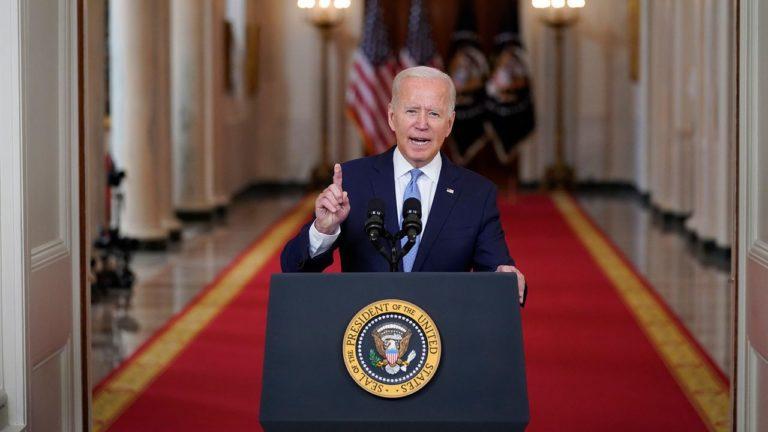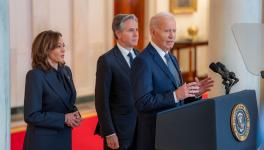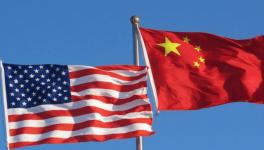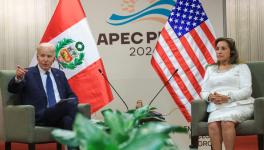Biden Doctrine Abates China Tension

US President Joe Biden speaking about the end of the war in Afghanistan, White House, Washington, August 31, 2021.
A 90-minute phone conversation between the presidents of the United States and China surely makes world news, but President Joe Biden’s call to his Chinese counterpart Xi Jinping on Friday draws special attention on its timing, backdrop and substance.
It comes ‘post-Afghanistan’, on the eve of the 20th ‘anniversary’ of the 9/11 attacks and amidst high expectations of a ‘Biden Doctrine’ struggling to be born in the US foreign policy. All three are defining moments amidst the backdrop of sure signs of a slow, steady decline of the United States accelerating of late.
An excellent essay in the Foreign Affairs magazine defines the Biden Doctrine as follows: A ‘coherent version of pragmatic realism—a mode of thought that prizes the advancement of tangible U.S. interests, expects other states to follow their own interests, and changes course to get what the United States needs in a competitive world… [marking] a welcome change from decades of over-assertive U.S. foreign policy that has squandered lives and resources in pursuit of unachievable goals.’ read more
Of course, the above definition is only partly correct. Wasn’t Biden an ardent advocate of the NATO expansion, the turning point in the post-cold war era big-power politics? George Kennan had forewarned at that time with great prescience:
“Why, with all the hopeful possibilities engendered by the end of the Cold War, should East-West relations become centered on the question of who would be allied with whom and, by implication, against whom in some fanciful, totally unforeseeable and most improbable future military conflict?”
“[B]luntly stated…expanding NATO would be the most fateful error of American policy in the entire post-Cold War era. Such a decision may be expected to inflame the nationalistic, anti-Western and militaristic tendencies in Russian opinion; to have an adverse effect on the development of Russian democracy; to restore the atmosphere of the cold war to East-West relations, and to impel Russian foreign policy in directions decidedly not to our liking … ”
Biden no doubt represented the American establishment and was full of the ‘unipolar moment’ like the the US strategic community and political elite. He supported the US-led military intervention in Yugoslavia and voted to authorise the wars in Afghanistan and Iraq. In the initial heady phase of the invasion of Iraq, he even saw the US putting that country ‘on the path to a pluralistic and democratic society.’
Yet, to be fair, once it became clear that the wars in Afghanistan and Iraq were going horribly wrong, Biden opposed any ‘surge’ strategy and urged quick exit. Call it a pragmatic realistic streak or the premonition of a consummate politician, herein lies the best hope for the Biden Doctrine, which he enunciated on August 31 in a landmark speech on the end of the war in Afghanistan.
It is a bit early to conclude that Afghanistan withdrawal presages a recast of the US military footprint globally — although domestic reform is the compelling reality today for Biden, which demands rollback of the imperial overreach.
Certainly, the touchstone will be the US’ excessively militarised and zero-sum approach in Asia. Biden’s call for extreme competition with China ratchets up tensions. If this extends to an explicit guarantee to defend Taiwan, Washington’s already extensive regional commitments would cross the red line.
Biden’s approach has been to intensify geopolitical rivalry with China while also welcome cooperation on common challenges, preserving room for diplomacy. However, Beijing has lately taken a tough line ruling out selective engagement — that is, unless the US jettisons its hostile attitude toward China to suppress it wilfully, cooperation is not possible.
It is from such a perspective that Biden’s call to Xi on Friday needs to be understood. The three-fold salience of the White House readout is, firstly, that a ‘broad, strategic discussion’ has taken place resulting in a mutual agreement to engage ‘openly and straightforwardly’ on areas where their interests converge as well as where ‘our interests, values and perspectives diverge.’
Secondly, Biden underscored the US’ commitment to ‘peace, stability, and prosperity’ in the Indo-Pacific and to ensure that ‘competition does not veer into conflict.’ Thirdly, this has been a politely-worded White House readout devoid of oneupmanship or aggressive hectoring.
The contrast with the curtly-worded White House readout of the first conversation on February 20 between Biden and Xi couldn’t be sharper. In February, Biden harped on ‘preserving a free and open Indo-Pacific’ and highlighted his ‘fundamental concerns about Beijing’s coercive and unfair economic practices, crackdown in Hong Kong, human rights abuses in Xinjiang, and increasingly assertive actions in the region, including toward Taiwan.’
Biden was hanging tough and his interest in bilateral engagement narrowed down to ‘pursuing [with China] practical, results-oriented engagements when it advances the interests of the American people and those of our allies.’ Period. On Friday, on the contrary, Biden has virtually come round to conceding Beijing’s insistence on a holistic approach to the relationship. It suggests a major rethink.
To be sure, the expansive Chinese readout is conspicuous for its note of satisfaction over the ‘candid, in-depth and extensive strategic communication and exchanges.’ Although the relationship has ‘run into serious difficulty’ only due to the US policy, Xi has gone the extra league:
‘Getting the relationship right is not an option, but something we must do and must do well… The two countries should look ahead and press forward, demonstrate strategic courage and political resolve, and bring China-U.S. relations back to the right track of stable development as soon as possible.’
But then, Xi also gently flagged that ‘engagement and dialogue to advance coordination and cooperation’ need to be ’on the basis of respecting each other’s core concerns and properly managing differences.’ Overall, Xi’s remarks moderates the tough ‘all-or-nothing’ optics of senior Chinese officials ruling out cooperation unless the US policies mended its ways.
The Chinese readout says Biden reaffirmed the US’ adherence to one-China policy and sought ‘more candid exchanges and constructive discussions with China to identify key and priority areas where cooperation is possible, avoid miscommunication, miscalculation and unintended conflict, and get U.S.-China relations back on track.’
Biden also said the US ‘looks forward to more discussions and cooperation with China to reach more common positions’ on important issues and spotlighted that ‘the future of the bulk of the world will depend on how the United States and China get on with each other.’
And the two leaders agreed to ‘maintain frequent contact by multiple means and instruct officials at the working level to intensify the work, conduct extensive dialogue and create conditions for the further development of China-U.S. relations.’
Did they exchange notes for an early meeting in person? That’s entirely conceivable now. Biden appears to be discarding the illusions of suppressing China. There is realisation that China’s help and cooperation is vital for addressing key global issues ranging from climate change and Afghanistan to North Korea and Iran.
Interestingly, all the recent high-level exchanges between the two countries have been initiated by the US side. Post-Afghanistan, through the past 3 weeks alone, Secretary of State Antony Blinken twice called Chinese State Councilor and Foreign Minister Wang Yi and Biden’s climate envoy John Kerry since communicated with Wang as well as Politburo member Yang Jiechi while visiting China.
All this underscores a sense of urgency in Washington to open a pathway toward Beijing. The US administration is grappling with complex foreign policy challenges and facing huge pressure domestically with crises on multiple fronts.
However, there is a contradiction here — the seething rivalry with rising China and the obsession with weakening the ‘strategic rival’ on one side and the acute need for China’s help and cooperation on the other side. Reconciling this contradiction becomes the litmus test of the Biden Doctrine.
Get the latest reports & analysis with people's perspective on Protests, movements & deep analytical videos, discussions of the current affairs in your Telegram app. Subscribe to NewsClick's Telegram channel & get Real-Time updates on stories, as they get published on our website.























